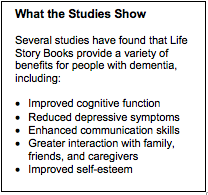The winter months often bring with them a time to reminisce – and create new memories. But for anyone who struggles with memory decline, this time of year can be a tough reminder of memories lost.
 “Throughout our lives, memories accumulate and are typically a source of comfort,” says Susan McKinney, vice president of operations at Lifetime Wellness, a certified dementia practitioner and trainer, and a recreational therapist. “Losing memory as a result of dementia can be difficult for that person and their caregiver. That’s why it’s important for those who care for someone living with dementia, either at home or in a memory care community, to find meaningful activities for memory stimulation.”
“Throughout our lives, memories accumulate and are typically a source of comfort,” says Susan McKinney, vice president of operations at Lifetime Wellness, a certified dementia practitioner and trainer, and a recreational therapist. “Losing memory as a result of dementia can be difficult for that person and their caregiver. That’s why it’s important for those who care for someone living with dementia, either at home or in a memory care community, to find meaningful activities for memory stimulation.”
Experiencing Memories
A key activity to reawaken memories is looking through a memory book such as the Lifetime Wellness Life Story Book often cited as an effective – and enjoyable – part of a person-centered dementia care plan.
The book includes pictures and text about a person’s life, for example, family members, friends, and pets; hometown and past residences; employment and educational history; hobbies; favorite meals; and travel experiences. Pictures and words can bring important information to the forefront and serve as a conversation-starting point for family, friends, and caregivers.
“The Life Story Book is essentially a summary of one’s life,” McKinney says. “It offers visual reminders that can jog memories about people, places, and experiences for those with a dementia care plan. It can also be used as a technique for positive diversion during difficult symptoms – and as an anchor in unfamiliar environments, such as the hospital.
The book can be especially helpful as dementia or Alzheimer’s progresses and memory diminishes. It becomes a tool not only for reawakening memories but also for honoring and validating the person with dementia.”
Encouraging Conversation
“Information in the book can trigger a variety of conversation starters about life experiences,” McKinney says. “For example, ‘What was your favorite song as a child? What was your most memorable vacation? What did you like best about your hometown?’
“The Life Story Book is stimulating not only for the person with dementia. It can be rewarding for anyone who interacts with that person.”
McKinney has observed the book’s ability to open opportunities for the person with dementia to talk about their favorite memories, what they are most proud of, and what they want others to know about them. Family members and friends can share what they appreciate about them, too. The book also serves as a resource for professional caregivers, providing more information about the life behind the resident they are caring for.
Empowering the Family
An easy way to give a memory book as a gift is to purchase a book template and customize it. Lifetime Wellness, for example, offers a spiral-bound Life Story Book with a range of personal topics, one for each week of the year. The book can be used in home and provider care settings.
“When families come together to compile the Life Story Book, the creative experience can be a healing tool and a celebration of their loved one’s life,” McKinney says. “It’s also a way to reinforce the connection between generations. The Life Story Book not only helps a person remember their life but also serves as a storybook for future generations. It’s a meaningful bridge to the past – and an enduring connection to the future.”
Give the gift of Life Story. Order online or Contact Lifetime Wellness to learn more.